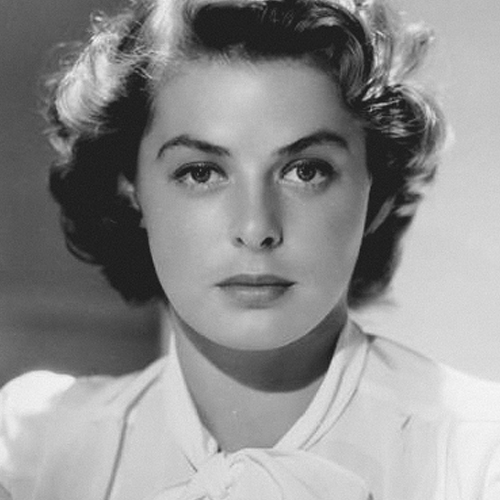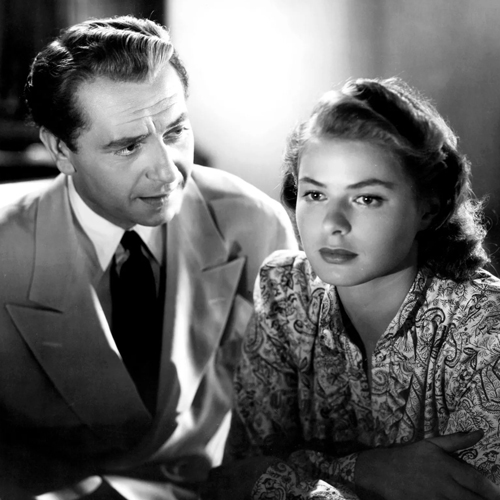
Ingrid Bergman
Born: 29 August 1915
Died: 29 August 1982 (67 Years)
Cause: On 29 August 1982 at 12:00 am, her 67th birthday, Ingrid Bergman died in London from breast cancer.
Died: 29 August 1982 (67 Years)
Cause: On 29 August 1982 at 12:00 am, her 67th birthday, Ingrid Bergman died in London from breast cancer.

Ingrid Bergman

Ingrid Bergman (Casablanca)
Ingrid Bergman (29 August 1915 – 29 August 1982) was a Swedish actress who starred in a variety of European and American films, television movies, and plays. With a career spanning five decades, she is often regarded as one of the most influential screen figures in cinematic history. She won numerous accolades, including three Academy Awards, two Primetime Emmy Awards, a Tony Award, four Golden Globe Awards, BAFTA Award and a Volpi Cup. She is one of only three actresses to have received three acting Academy Awards (only Katharine Hepburn has four).
Born in Stockholm to a Swedish father and a German mother, Bergman began her acting career in Swedish and German films. Her introduction to the U.S. audience came in the English-language remake of Intermezzo (1939). Known for her naturally luminous beauty, she starred in Casablanca (1942) as Ilsa Lund, her most famous role, opposite Humphrey Bogart. Bergman's notable performances in the 1940s include the dramas For Whom the Bell Tolls (1943), Gaslight (1944), The Bells of St. Mary's (1945), and Joan of Arc (1948), all of which earned her nominations for the Academy Award for Best Actress; she won for Gaslight. She made three films with Alfred Hitchcock: Spellbound (1945), with Gregory Peck, Notorious (1946), opposite Cary Grant and Under Capricorn (1949), alongside Joseph Cotten.
In 1950, she starred in Roberto Rossellini's Stromboli, released after the revelation she was having an affair with Rossellini; that and her pregnancy prior to their marriage created a scandal in the U.S. that prompted her to remain in Europe for several years. During this time she starred in Rossellini's Europa '51 and Journey to Italy (1954), now critically acclaimed, the former of which won her the Volpi Cup for Best Actress. She had a successful return to working for a Hollywood studio in Anastasia (1956), winning her second Academy Award for Best Actress. Soon after, she co-starred with Grant in the romance Indiscreet (1958). In later years, Bergman won her third Academy Award, this one for Best Supporting Actress, for her role in Murder on the Orient Express (1974). In 1978, she starred in Ingmar Bergman's (no relation) Swedish Autumn Sonata receiving her sixth Best Actress nomination. Bergman spoke five languages – Swedish, English, German, Italian and French – and acted in each.
In her final role, she portrayed the late Israeli Prime Minister Golda Meir in the television miniseries A Woman Called Golda (1982) for which she posthumously won her second Emmy Award for Best Actress. In 1974, Bergman discovered she was suffering from breast cancer but continued to work until shortly before her death on her sixty-seventh birthday (29 August 1982). According to the St. James Encyclopedia of Popular Culture, upon her arrival in the U.S. Bergman quickly became "the ideal of American womanhood" and a contender for Hollywood's greatest leading actress. David O. Selznick once called her "the most completely conscientious actress" he had ever worked with. In 1999, the American Film Institute recognised Bergman as the fourth greatest female screen legend of Classic Hollywood Cinema.
During the run of The Constant Wife in London, Bergman discovered a small hard lump on the underside of her left breast. On 15 June 1974, she entered a London clinic and had her first operation. While working on Autumn Sonata, Bergman discovered another lump, and flew back to London for another surgery. Afterwards, she began rehearsals for Waters of the Moon (1978).
Despite her illness, she agreed to play Golda Meir in 1981. Bergman retired to her apartment in Cheyne Gardens, London after the film had finished where she suffered from chemotherapy. Photographers had camped outside on the pavement of her London apartment. Because the cameras had telephoto lenses, Bergman refrained from approaching the front window. At this point, the cancer had spread to her spine, collapsing her twelfth vertebra. Her right lung no longer functioned, and only a small part of her left lung had not collapsed.
On 29 August 1982 at 12:00 am, her 67th birthday, Ingrid Bergman died in London from breast cancer. Her ex-husband, Lars Schmidt, and three others were there, where they drank their last toast to her hours earlier. A copy of The Little Prince was at her bedside, opened to a page near the end. The memorial service was held in Saint Martin-in-the-Fields church in October with twelve hundred mourners in attendance. Her children were in attendance. In addition to the Rossellinis, relatives from Sweden, Liv Ullmann, John Gielgud, Wendy Hiller, Birgit Nilsson, Joss Ackland and many others attended. As part of the service, quotations from Shakespeare were read. Musical selections included "This Old Man" from The Inn of the Sixth Happiness, a piece by Beethoven, and strains of "As Time Goes By". Bergman's grandson, Justin Daly, recalled the event as hundreds of photographers were waiting and taking pictures. One of the cameras hit on his head. He added, "In the middle of all this chaos, I could sense that she wasn't just my grandmother. She belonged to everyone else. She belonged to the world."
Ingrid Bergman was cremated at a private funeral ceremony attended only by close relatives and five friends. After cremation at Kensal Green Cemetery, London, her ashes were taken to Sweden. Most were scattered into the sea, around the islet of Dannholmen near the fishing village of Fjällbacka in Bohuslän. The location is on the west coast of Sweden, a place where she had spent most of the summers from 1958 until her death. The remainder of her ashes were placed next to her parents' ashes in Norra Begravningsplatsen (Northern Cemetery), Stockholm, Sweden.
(wikipedia)
Born in Stockholm to a Swedish father and a German mother, Bergman began her acting career in Swedish and German films. Her introduction to the U.S. audience came in the English-language remake of Intermezzo (1939). Known for her naturally luminous beauty, she starred in Casablanca (1942) as Ilsa Lund, her most famous role, opposite Humphrey Bogart. Bergman's notable performances in the 1940s include the dramas For Whom the Bell Tolls (1943), Gaslight (1944), The Bells of St. Mary's (1945), and Joan of Arc (1948), all of which earned her nominations for the Academy Award for Best Actress; she won for Gaslight. She made three films with Alfred Hitchcock: Spellbound (1945), with Gregory Peck, Notorious (1946), opposite Cary Grant and Under Capricorn (1949), alongside Joseph Cotten.
In 1950, she starred in Roberto Rossellini's Stromboli, released after the revelation she was having an affair with Rossellini; that and her pregnancy prior to their marriage created a scandal in the U.S. that prompted her to remain in Europe for several years. During this time she starred in Rossellini's Europa '51 and Journey to Italy (1954), now critically acclaimed, the former of which won her the Volpi Cup for Best Actress. She had a successful return to working for a Hollywood studio in Anastasia (1956), winning her second Academy Award for Best Actress. Soon after, she co-starred with Grant in the romance Indiscreet (1958). In later years, Bergman won her third Academy Award, this one for Best Supporting Actress, for her role in Murder on the Orient Express (1974). In 1978, she starred in Ingmar Bergman's (no relation) Swedish Autumn Sonata receiving her sixth Best Actress nomination. Bergman spoke five languages – Swedish, English, German, Italian and French – and acted in each.
In her final role, she portrayed the late Israeli Prime Minister Golda Meir in the television miniseries A Woman Called Golda (1982) for which she posthumously won her second Emmy Award for Best Actress. In 1974, Bergman discovered she was suffering from breast cancer but continued to work until shortly before her death on her sixty-seventh birthday (29 August 1982). According to the St. James Encyclopedia of Popular Culture, upon her arrival in the U.S. Bergman quickly became "the ideal of American womanhood" and a contender for Hollywood's greatest leading actress. David O. Selznick once called her "the most completely conscientious actress" he had ever worked with. In 1999, the American Film Institute recognised Bergman as the fourth greatest female screen legend of Classic Hollywood Cinema.
During the run of The Constant Wife in London, Bergman discovered a small hard lump on the underside of her left breast. On 15 June 1974, she entered a London clinic and had her first operation. While working on Autumn Sonata, Bergman discovered another lump, and flew back to London for another surgery. Afterwards, she began rehearsals for Waters of the Moon (1978).
Despite her illness, she agreed to play Golda Meir in 1981. Bergman retired to her apartment in Cheyne Gardens, London after the film had finished where she suffered from chemotherapy. Photographers had camped outside on the pavement of her London apartment. Because the cameras had telephoto lenses, Bergman refrained from approaching the front window. At this point, the cancer had spread to her spine, collapsing her twelfth vertebra. Her right lung no longer functioned, and only a small part of her left lung had not collapsed.
On 29 August 1982 at 12:00 am, her 67th birthday, Ingrid Bergman died in London from breast cancer. Her ex-husband, Lars Schmidt, and three others were there, where they drank their last toast to her hours earlier. A copy of The Little Prince was at her bedside, opened to a page near the end. The memorial service was held in Saint Martin-in-the-Fields church in October with twelve hundred mourners in attendance. Her children were in attendance. In addition to the Rossellinis, relatives from Sweden, Liv Ullmann, John Gielgud, Wendy Hiller, Birgit Nilsson, Joss Ackland and many others attended. As part of the service, quotations from Shakespeare were read. Musical selections included "This Old Man" from The Inn of the Sixth Happiness, a piece by Beethoven, and strains of "As Time Goes By". Bergman's grandson, Justin Daly, recalled the event as hundreds of photographers were waiting and taking pictures. One of the cameras hit on his head. He added, "In the middle of all this chaos, I could sense that she wasn't just my grandmother. She belonged to everyone else. She belonged to the world."
Ingrid Bergman was cremated at a private funeral ceremony attended only by close relatives and five friends. After cremation at Kensal Green Cemetery, London, her ashes were taken to Sweden. Most were scattered into the sea, around the islet of Dannholmen near the fishing village of Fjällbacka in Bohuslän. The location is on the west coast of Sweden, a place where she had spent most of the summers from 1958 until her death. The remainder of her ashes were placed next to her parents' ashes in Norra Begravningsplatsen (Northern Cemetery), Stockholm, Sweden.
(wikipedia)

